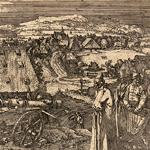AUTHOR ESSAY: What Women Really Think About Abortion
The Abortion Myth was first published in Australia (Allen & Unwin, 1998) where I’ve been living for the last eleven years. However, the kernel of the book was formed in the country of my birth, the United States.
Aged fourteen, I remember accompanying my mother to the office of a local senate candidate to stuff envelopes for his reelection push. I don’t know if either of us even knew the candidate’s name, or what he stood for, beyond the fact that he was pro–choice. This was 1979, and the intentions of Ronald Reagan were already written on the wall, though few would have predicted how successful the anti–choice movement would become. If you’d asked me why I cared so passionately about the abortion issue, I almost certainly would have shrugged my shoulders in an irritated way and said “I don’t knooow.”
It took me a few years, but I think I now do know why the topic of abortion fascinates me. When I was younger I suspect I knew on some visceral level what I now know intellectually: that without full reproductive rights—and that includes abortion—women’s crusade for freedom and equality is beaten before it’s begun.
But the other reason I was and remain so spellbound by the abortion issue is that I never felt the whole story was being told. Yes, I surely believed— as I do now—that women have a right to choose an abortion, but I was unsure if abortion was a choice I could ever make. I remember during high school experiencing a great deal of confusion about these feelings and keeping them to myself for fear that voicing them would lead to my being mistaken for a “right–to–lifer.”
ARTIFICIAL WOMBS
Not long after I immigrated to Australia, I began a masters’ at the Centre for Human Bioethics at Monash University in Melbourne. One of the required texts was a book co–authored by Professor Peter Singer and Deane Wells called Making Babies: The New Science and Ethics of Conception (Scribner, 1985).
The authors speculated that in the future neo–natal incubators would be able to gestate very young fetuses, far younger than the 22–week–old ones currently salvaged by such technology. This would mean that women facing unplanned pregnancies would be able to evacuate their fetuses to such artificial wombs, rather than kill them through conventional abortion techniques. The authors predicted that artificial wombs would satisfy both the concerns of the anti–choice movement, by keeping the fetus alive, and the pro–choice feminists, by allowing women “to control their bodies.” Fetal evacuation would render abortion unethical.
Were they kidding? I can still remember how astounding I found these conclusions. Did Singer and Wells really think that unhappily pregnant women would see the artificial womb as solving the same problems solved by conventional abortion? How out of touch with the meaning to women of pregnancy, motherhood and abortion could they be? But it didn’t take me long to realize that the solution was of our own making. Pro–choice feminists had argued that the loss of bodily autonomy— or “control”—during nine months of unwanted pregnancy was the real problem with denying women abortion rights. They had never argued—had never needed to argue—that death of the fetus was essential. The artificial womb brought the central moral question of abortion to the forefront.
So I decided to do my master’s thesis, and later to write a book, on women’s views of the artificial womb, adoption, and abortion. Was my intuition correct that most—if not all— would reject the artificial womb for failing to solve what women saw as the real problems posed by unplanned pregnancy? Could and should feminist pro–choice rhetoric be adjusted to reflect women’s experiences and understandings of pregnancy and motherhood— and so their intentions and goals when deciding to abort?
To find out, I had to do what is done so rarely in abortion research—to ask women about their views and experience of abortion, and how they made sense of the issue ethically. I interviewed 45 women of child–bearing age, equally divided between pro–choice and antichoice. Their stories reveal that abortion is not straight–forward. They were clear that abortion is a difficult and a moral decision. The book is definitely prochoice, but the ethic spelled out comes from women in the “mushy middle,” those who know that women must have the right to choose, but recognize that with rights come responsibilities.
Heady topic, I know, but I made a spectacular effort to write the book in jargon–free English. Academic–jargon drives me crazy, and I figure that if this is my response to it, feelings among a lay audience must run even higher. My most treasured review of it came by word–of–mouth. Apparently the book made the rounds among the staff at one of the local Catholic hospitals. Most rated it “extremely balanced.”
Leslie Cannold, ’87 is a research fellow at the Centre for Philosophy and Public Ethics at the University of Melbourne. Her column appears regularly in the Melbourne broadsheet The Age and occasionally in theBrisbane Courier Mail and Women’s E–news. She is heard weekly on ABC radio’s regional drive program. The working title of her next book, based on her doctoral thesis, is tentatively titled Women Who Choose Not To Have Children and Other 21st– Century Myths.

